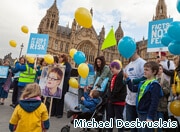A TV star who has a son with Down Syndrome has added her voice to a campaign against a new pregnancy test for the condition.
Sally Phillips, who has featured in the BBC’s Miranda and the Bridget Jones’s Diary films, made the comments as campaigners rallied outside the Houses of Parliament.
The Don’t Screen Us Out group say that a new non-invasive test will lead to further abortions for children with Down Syndrome.
Myths busted
Figures from The National Down Syndrome Cytogenetic Register show that between 1989 and 2013, an average of 92 per cent of children diagnosed with Down Syndrome are killed in the womb every year.
A pilot study predicted that 102 more babies with Down Syndrome would be detected under the new test, with the campaigners saying this would lead to an increase in abortions annually.
In a video message Phillips said: “It’s so important that we bust these myths about Down’s syndrome and that we get rid of all the out of date information that is out there”.
“For too long the government have acted as if our lives don’t matter”, she added.
Real support
Lynn Murray, speaking for the Don’t Screen Us Out campaign, called on Health Secretary Jeremy Hunt to reject the new tests.
She said: “As a parent of a teenage daughter with Down’s syndrome, I’ve had 16 years of seeing the effects of screening on the lives of people with Down’s syndrome and their families.
“These new tests will make this situation worse, not better.
“The UK government should be putting its energy behind providing real support for our families and other parents who are expecting a child with Down’s syndrome.”
Informal eugenics
The campaigners warn that the test would “enable a kind of informal eugenics in which certain kinds of disabled people are effectively ‘screened out’ of the population before they are even born”.
In January the sister of a girl with Down Syndrome also spoke out against the new test.
In an emotional ‘video letter’ Lucy Varley said that a world without Down Syndrome children “would be a very sad place indeed”.
Last month World Down Syndrome Day was marked with people raising awareness of the condition and celebrating the role people with Down Syndrome play.

